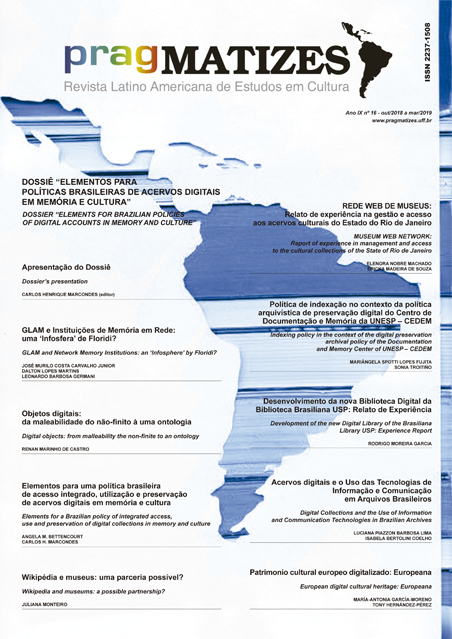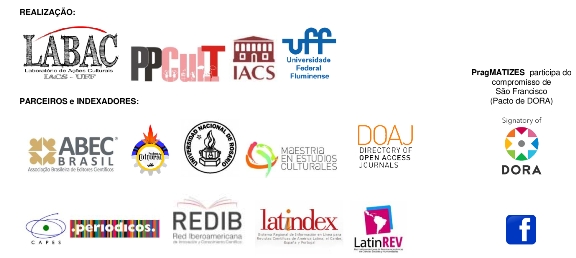GLAM e Instituições de Memória em Rede: uma 'Infosfera' de Floridi?
DOI:
https://doi.org/10.22409/pragmatizes.v0i16.27529Resumo
A Ciência da Informação participa na promoção do termo 'Instituição de Memória' como metáfora para a integração de bibliotecas, arquivos, museus e centros de documentação. Uma das intenções assumidas foi a de encorajar uma visão coerente sobre os recursos informacionais que os acervos de tais instituições provêm. Em paralelo, a partir do movimento em se integrar acervos digitalizados do campo da cultura em rede emerge o acrônimo GLAM da língua inglesa, que integra Galerias, Bibliotecas, Arquivos e Museus, e enfatiza a promoção do acesso como missão principal. É justo afirmar que a demanda pela interoperabilidade dos acervos dos diferentes domínios arquivísticos é pautada pela possibilidade de integração dos conteúdos diversos via web, cenário que propicia inovação no acesso e no processamento das informações de patrimônio cultural pela sociedade. A partir de um foco na reconstrução crítica de Richard Fyffe, sobre o papel do especialista em CI na perspectiva da Infosfera de Floridi, buscamos identificar como novos conceitos para o campo da Ciência da Informação, derivados da FI e da Ética da Informação (EI) de Floridi, podem auxiliar a compreensão de transformações radicais em curso no campo dos acervos digitalizados de instituições de memória, e sua relação com as questões éticas mais amplas no plano da Infosfera.
Downloads
Referências
AMERICAN ALLIANCE OF MUSEUMS. Code of ethics for museums. 2000. [citado por B. V. der Veer Martens / New grounds for ontic trust: Information objects and LIS] In AAM Website: http://www.aam-us.org/resources/ethics-standards-and-best-practices/code-of-ethics Acessado em: 18/01/2018
AMERICAN LIBRARY ASSOCIATION. Core values of librarianship statement. 2004. [citado por B. Van der Veer Martens / New grounds for ontic trust: Information objects and LIS]. In ALA Website: http://www.ala.org/advocacy/intfreedom/statementspols/corevalues. Acessado em: 18/01/2018
ARAÚJO, Carlos Alberto Ávila. Arquivologia, biblioteconomia, museologia e ciência da informação: o diálogo possível – Brasília, df : Briquet de Lemos / Livros / São Paulo : Associação Brasileira de Profissionais da Informação (abrainfo), 2014.
ASSOCIATION OF COLLEGE AND RESEARCH LIBRARIES. Framework for information literacy in higher education. 2015. [citado por B. Van der Veer Martens / New grounds for ontic trust: Information objects and LIS]. In ACRL Website: http://www.ala.org/acrl/standards/ilframework Acessado em: 18/01/2018
BARTHOLMEI, Stephan, Rachel Franks, James Heilman, Mylee Joseph, Vicki McDonald, Anna Raunik, Mia Ridge, and Mark Robertson. “Opportunities for Academic and Research Libraries and Wikipedia.” Columbus, Ohio, 2016. Available from: https://2016.ifla.org/wp-content/uploads/sites/2/2016/08/112-IFLAWikipediaAcademicandResearchLibrariesDiscussioDRAFT.pdf. Acessado em: 18/05/2018
BAWDEN, D. & ROBINSON, L. Into the infosphere: theory, literacy and education for new forms of document. In: M. Ivanovic & S. Tanackovic (Eds). Ogledi o informacijskim znanostima: Zbornik radova u Cast Tatjane Aparac-Jelusic. pp. 176-186. Osijek, Croatia.
BAWDEN, D. & ROBINSON, L. Curating the inphosfere: Luciano Floridi's Philosophy of Information as the foundation for Library and Information Science. Journal of Documentation. 2017.
BUCKLAND, Michael. What Kind of Science Can Information Science Be?, Journal of the American Society for Information Science and Technology. 2012. 63p (1) 1-7.
CUMMINGS, J. A simple guide to reusing media from Wikimedia Commons. Retrieved from https://commons.wikimedia.org/wiki/Commons:Simple_media_reuse_guide. 2016. Acessado em: 18/05/2018.
DALBELLO, M. Cultural Dimensions of Digital Library Development, Part I: Theory and Methodological Framework for a Comparative Study of the Cultures of Innovation in Five European National Libraries, Library Quarterly, 2008. 355-395p
DAY, Ronald E. Indexing it all. Cambridge (MA); MIT Press; [citado por B. Van der Veer Martens / New grounds for ontic trust: Information objects and LIS]. 2014.
ESS, Charles. Floridi's philosophy of information and information ethics: Current perspectives, future directions. The Information Society. 2009. 25(3), 159–168.
FLORIDI, Luciano. Information ethics: On the philosophical foundation of computer ethics. Ethics and Information Technology. 1999a. 1, 37–56.
FLORIDI, Luciano. Philosophy and computing: An introduction. New York: Routledge. [citado por B. Van der Veer Martens / New grounds for ontic trust: Information objects and LIS]. 1999b.
FLORIDI, Luciano. Information ethics: An environmental approach to the digital divide. Philosophy in the Contemporary World. 2001. 9(1), 1–7.
FLORIDI, Luciano. On defining library and information science as applied philosophy of information. Social Epistemology. 2002a. 16(1), 37–49.
FLORIDI, Luciano. On the intrinsic value of information objects and the infosphere. Ethics and Information Technology. 2002b. , 4, 287–304.
FLORIDI, Luciano. Four challenges for a theory of informational privacy. Ethics and Information Technology. 2006. 8(3):109–119. http://www.philosophyofinformation.net/
FLORIDI, Luciano. A look into the future impact of ICT on our lives. The Information Society, . 2007. 23, 59–64.
FLORIDI, Luciano. The philosophy of information as a conceptual framework. Knowledge, Technology and Policy. 2010. [citado por B. Van der Veer Martens / New grounds for ontic trust: Information objects and LIS] 23, 253–281.
FLORIDI, Luciano. A defence of constructionism: philosophy as conceptual engineering. Metaphilosophy, v. 42, n. 3, 282-304, 2011a. Disponível em: <http://www.philosophyofinformation.net/publications/pdf/adofpace.pdf> . [Citado por Maria Nélida Gonzalez / Luciano Floridi e os problemas filosóficos da informação: da representação à modelização] Acesso em: dez. 2012
FLORIDI, Luciano. The philosophy of information. Oxford: Oxford University Press, [Citado por Maria Nélida Gonzalez / Luciano Floridi e os problemas filosóficos da informação: da representação à modelização] 2011b.
FLORIDI, Luciano. The ethics of information. New York; Oxford University Press. 2013.
FLORIDI, Luciano. Perception and testimony as data providers. 2012. p 1-30. Pre-print. Disponível em: <http://www.philosophyofinformation.net/publications/pdf/patadp.pdf> [Citado por Maria Nélida Gonzalez / Luciano Floridi e os problemas filosóficos da informação: da representação à modelização] Acesso em: fev. 2013.
FLORIDI, Luciano. Google's ethic adviser: The law needs bold ideas to address the digital age - The Guardian-Technology, 2014a. Disponível em: <https://www.theguardian.com/technology/2014/jun/04/google-ethics-law-right-to-be-forgotten-luciano-floridi> . Acesso em: 19/01/2014
FLORIDI, Luciano. Google's privacy ethics adviser tour of Europe: a complex balancing act - The Guardian-Technology, 2014b. Disponível em: <https://www.theguardian.com/technology/2014/sep/16/googles-european-privacy-ethics-tour>. Acesso em: 19/01/2014
FLORIDI, Luciano. Google ethics tour: should readers be told a link has been removed? - The Guardian-Technology, 2014c. Disponível em: <https://www.theguardian.com/technology/2014/sep/29/google-ethics-tour-right-to-be-forgotten>. Acesso em: 19/01/2014
FLORIDI, Luciano. The right to be forgotten - the road ahead - The Guardian-Technology, 2014d. Disponível em: <https://www.theguardian.com/technology/2014/oct/08/the-right-to-be-forgotten-the-road-ahead> . Acesso em: 19/01/2014
FLORIDI, Luciano. Right to be forgotten: who may exercise power, over which kind of information - The Guardian-Technology, 2014e. Disponível em: <https://www.theguardian.com/technology/2014/oct/21/right-to-be-forgotten-who-may-exercise-power-information>. Acesso em: 19/01/2014
FLORIDI, Luciano. Right to be forgotten poses more questions than answers - in The Guardian-Technology, 2014f. Disponível em: <https://www.theguardian.com/technology/2014/nov/11/right-to-be-forgotten-more-questions-than-answers-google> . Acesso em: 19/01/2014
FLORIDI, Luciano. Right to be forgotten: A diary of the Google Advisory Council Tour - in philosophyofinformation.net, 2014g. Disponível em: <http://www.philosophyofinformation.net/right-to-be-forgotten-a-diary-of-the-google-advisory-council-tour/> . Acesso em: 19/01/2014
FYFFE, Richard. The value of information: Normativity, epistemology, and LIS in Luciano Floridi. portal: Libraries and the Academy. 2015. [citado por B. Van der Veer Martens / New grounds for ontic trust: Information objects and LIS]; 15(2): 267-86.
GONZALEZ, Maria Nélida. Luciano Floridi e os problemas filosóficos da informação: da representação à modelização. InCID: R. Ci. Inf. e Doc., Ribeirão Preto, v. 4, n.1, p. 03-25, jan./jun. 2013.
GLAM (Industry Sector). 04/12/2017. In Wikipedia, a Enciclopédia Livre. https://en.wikipedia.org/wiki/GLAM_(industry_sector) Acessado em 18/12/2018.
HACKING, Ian. The Social Construction of What? Cambridge (MA); Harvard University Press; [citado B.VdV Martens/New grounds for ontic trust:Information objects &LIS] 1999.
HERRIT, Robert. Google's Philosopher. in Pacific Standard, 2015. Disponível em: <https://psmag.com/environment/googles-philosopher-technology-nature-identity-court-legal-policy-95456> Acesso em: 19/01/2014
IBM Marketing Cloud. 10 Key Marketing Trends For 2017. 2017. Disponível em IBM Website: https://www-01.ibm.com/common/ssi/cgi-bin/ssialias?htmlfid=WRL12345USEN Pg 3. Acessado em: 18/01/2018
KNELL, S. J. The Shape of Things to Come: Museums in the Technological Landscape, Museum and Society, 2003. 132-146p
KOEHLER, W. Ethics and values in librarianship. Lanham (MD); Rowman and Littlefield; [citado por B. Van der Veer Martens / New grounds for ontic trust: Information objects and LIS] 2015. 242p
LEWIS, J. & HARMAND, S. An earlier origin for stone tool making: Implications for cognitive evolution and the transition to Homo. Philosophical Transactions of the Royal Society. [citado por B. Van der Veer Martens / New grounds for ontic trust: Information objects and LIS] 2016.
MARTENS, Betsy V. D. V.. An Illustrated Introduction to the Infosphere. Library Trends. 2015. 63. 317-361.
MARTENS, Betsy V. D. V.. New Grounds for ontic trust: Information objects and LIS. Education for Information, 33. IOS Press. 2017. 37-54
MARTINS, Dalton, CARVALHO JR., José Murilo. Memória como Prática na Cultura Digital. in TIC Cultura 2016. Comitê Gestor da Internet - São Paulo. 2017. 45-52p
Memory of the World: General Guidelines to safeguard documentary heritage / prepared for UNESCO on behalf of IFLA by Stephen Foster, Jan Lyall, Duncan Marshall and Roslyn Russel. - Paris : UNESCO, 1995. - viii, 77 p. ; 30 cm. - (CII-95/WS-l1)
OSBURN, Charcles. The social transcript: Uncovering Library Philosophy. Westport (CT); Libraries Unlimited; 2009. [citado por B. Van der Veer Martens / New grounds for ontic trust: Information objects and LIS] 228-229p
OXFORD Internet Institute. Luciano Floridi Appointed to Google’s Advisory Council on the Right to be Forgotten. 2014. In "News", Disponível em: <https://www.oii.ox.ac.uk/news/releases/luciano-floridi-appointed-to-googles-advisory-council-on-the-right-to-be-forgotten/>
PRODAN, Anca Claudia. The digital "Memory of the World": an exploration of documentary practices in the age of digital technology. 2014. Volume 3 of Heritage Studies - Walter De Gruyter Incorporated, 2016.
SOCIETY OF AMERICAN ARCHIVISTS - SAA. Core values statement and code of ethics. 2011. [citado por B. Van der Veer Martens / New grounds for ontic trust: Information objects and LIS]. In SAA Website: http://www2.archivists.org/statements/saa-core-values-statement-and-code-of-ethics Acessado em: 18/01/2018
UNESCO, “Memory of the World Register Companion”. Official Website of the Memory of the World Programme, 2011, http://www.unesco.org/new/fileadmin/MULTIMEDIA/HQ/CI/CI/pdf/mow/Register%20Companion.pdf Acessado em: 19/05/2018.
UNESCO, “Recommendation Concerning the Preservation of, and Access to, Documentary Heritage Including Digital Form”. Official Website of the Memory of the World Programme, 2015, https://en.unesco.org/sites/default/files/2015_mow_recommendation_implementation_guidelines_en.pdf Acessado em: 19/05/2018.
Downloads
Publicado
Como Citar
Edição
Seção
Licença
Autores que publicam nesta revista concordam com os seguintes termos:- Autores mantém os direitos autorais e concedem à revista o direito de propriedade, com o trabalho simultaneamente licenciado sob a Licença Creative Commons Attribution que permite o compartilhamento do trabalho com reconhecimento da autoria e publicação inicial nesta revista.
- A revista se reserva o direito de efetuar, nos originais, alterações de ordem normativa, ortográfica e gramatical.
- As provas finais não serão submetidas aos autores.
- As opiniçoes emitidas pelos autores são de sua exclusiva responsabilidade.



